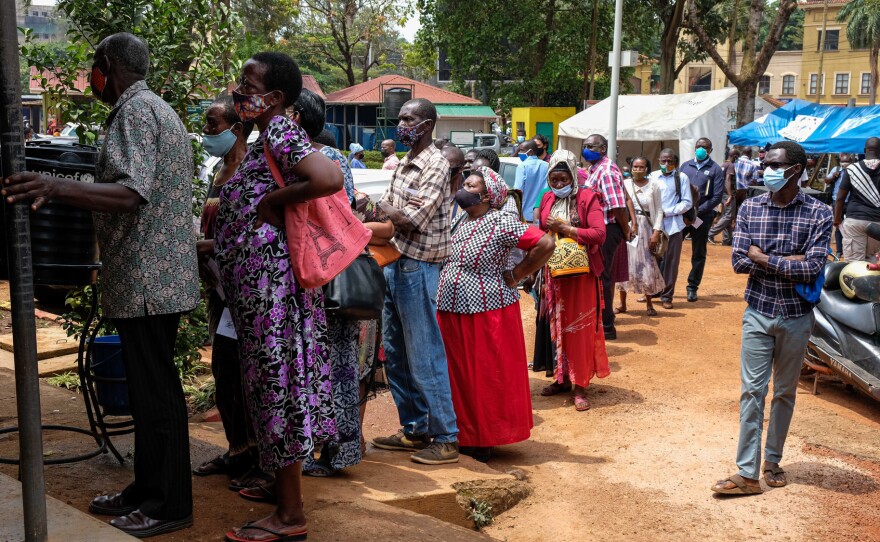In September, the U.S. will start offering a third COVID-19 shot to all adults vaccinated with Pfizer and Moderna, even though these vaccines still offer high protection against hospitalization and death from the delta variant.
Officials at the World Health Organization said Wednesday that it strongly opposes booster shots for all adults in rich countries because the boosters will not help slow down the pandemic. By diverting doses away from unvaccinated people, booster shots will help drive the emergence of more dangerous mutants, the WHO doctors said.
"I'm afraid that this [booster recommendation] will only lead to more variants. ... And perhaps we're heading into an even more dire situation," WHO chief scientist Dr. Soumya Swaminathan said.
The problem with a call for boosters, she said, is that the virus is primarily circulating in unvaccinated people — not in the fully vaccinated.
U.S. believes you don't have to sacrifice boosters to help the rest of the world
In defending the U.S. booster decision, Dr. Vivek Murthy, the surgeon general, said on Wednesday: "I do not accept the idea that we have to choose between America and the world. We clearly see our responsibility to both, and we believe we have to work on both fronts as we have been."
Federal officials said they have sent more than 100 million doses overseas and plan to donate 500 million doses.
But much of the world lags far behind wealthy countries in vaccine supply
The WHO estimates 11 billion doses are needed to bring the pandemic under control. Billions of people have not received even one dose of the vaccine, said Dr. Bruce Aylward, senior adviser to the WHO director-general. In most low-income countries, less than 5% of the population is immunized. The unvaccinated include many health care workers and people at high risk of death and severe disease. In many middle-income countries, including most of Latin America, only about a third of the population has received shots.
To stop the evolution of new variants, the world needs to focus on immunizing these populations before handing out extra protection to low-risk individuals in rich countries, Aylward said. "The problem is not enough people have been vaccinated. So our first priority is relatively simple: Get as many of the unvaccinated with two doses before you move beyond that."
Rachel Silverman, a health researcher at the Center for Global Development, agrees. "I recognize it's a complicated policy decision for the Biden administration [on whether to offer boosters], and their primary responsibility is to American citizens," she said.
"On the other hand, if you're looking at how to get the world — and Americans — out of this crisis, just doubling down on vaccinating Americans with more and more boosters isn't going to work while there's widespread global circulation of the virus. Inevitably more variants will pop up, and one of them will inevitably be vaccine resistant.
"So recommending boosters is a bit of a myopic policy," Silverman added.
You don't have to turn down a booster, but there are ethical issues for world leaders to consider
But the solution isn't for individuals in wealthy countries to turn down boosters, she said. "There's not necessarily any direct benefit to someone like you or me refusing a vaccine," she said. "That doesn't mean it's actually going to go into someone else's arm. So I don't think it makes ethical sense as an individual to refuse a vaccine or a booster for that purpose. But certainly at a social level and a society-wide level, the ethics of making that prioritization decision are pretty tenuous."
Any booster policy is questionable from an ethical standpoint, asserts WHO Director-General Tedros Adhanom Ghebreyesus. Offering booster shots will only exacerbate the massive vaccine inequity already present worldwide, Tedros said. "The divide between the haves and have-nots will only grow larger if manufacturers and leaders prioritize booster shots over supply to low- and middle-income countries," he said.
Any available vaccine should first go to people around the world who are at high risk of hospitalization and deaths, said Dr. Michael Ryan of the WHO. "If we think about this in terms of an analogy, we're planning to hand out extra life jackets to people who already have life jackets, while we're leaving other people to drown without a single life jacket."
Copyright 2021 NPR. To see more, visit https://www.npr.org.






